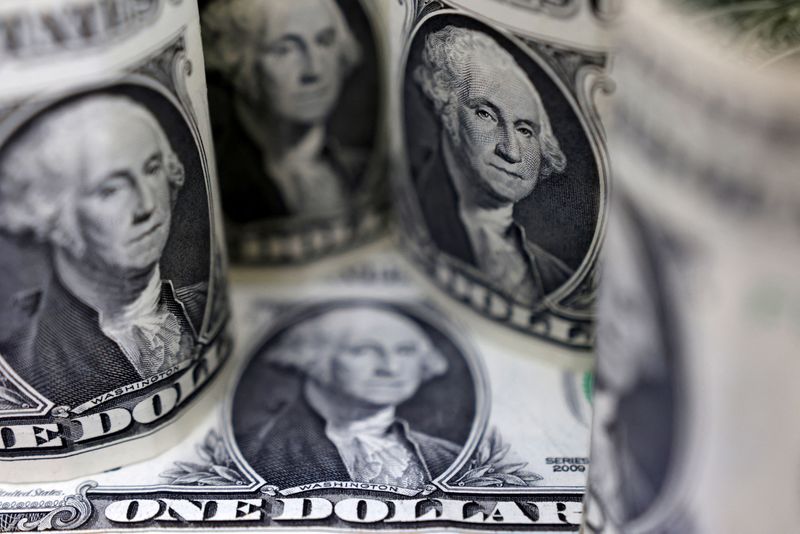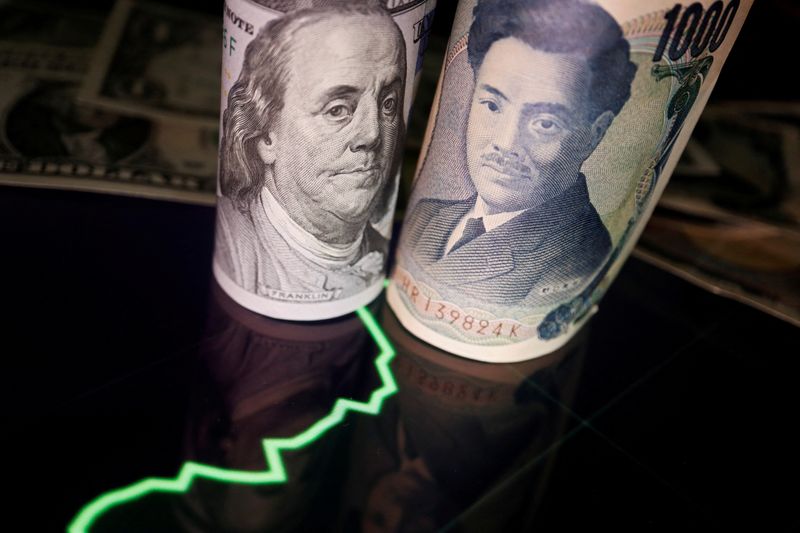By John McCrank
NEW YORK (Reuters) -The dollar index vaulted to a 20-year high on Thursday, and notched a 24-year peak against the rate-sensitive Japanese yen, after U.S. data showed a resilient economy, giving the Federal Reserve more room to aggressively hike interest rates to quell inflation.
The U.S. currency firmed after a government report showed that the number of Americans filing new claims for unemployment benefits declined further last week, consistent with strong demand for workers and tight labor market conditions.
The report also showed fewer layoffs in August, despite hefty interest rate increases from the Fed to counter decades-high inflation, which have raised the risk of a recession.
Data from the Institute for Supply Management (ISM) showed U.S. manufacturing grew steadily in August as employment and new orders rebounded, while a further easing in price pressures strengthened views that inflation has likely peaked.
"It comes as no surprise that the dollar hit a fresh record high on both safe-haven flows from global economic weakness and as a resilient U.S. economy paves the way for the Fed to remain aggressive," said Edward Moya, chief market analyst at Oanda.
"King dollar has awoken from a nap and that could spell a lot more pain for the European currencies," he said.
The U.S. dollar index, which measures the greenback against a basket of six currencies, was up 0.671% at 109.59, at 3:10 p.m. Eastern time (1910 GMT), having earlier touched 109.99, its highest since June 2002.
Expectations for a third straight 75-basis-point U.S. rate hike at the Sept. 20-21 Fed meeting are rising on the back of solid economic data, with Fed funds futures last pointing to around a 77.1% chance of such an increase.
This helped push the yield on benchmark 10-year U.S. Treasuries to a more than two-month high of 3.297.
The market's attention will now turn to the August U.S. nonfarm payrolls report, due on Friday, which will be one of the key data points guiding Fed members when they meet later this month.
A strong reading could help the safe-haven dollar attract more demand.
"Even after hitting fresh records, USD strength has scope to extend somewhat further, boosted by the global slowdown and the European energy crunch in particular," said analysts at Generali (BIT:GASI) Insurance Asset Management.
The euro slid 0.99%, falling back below parity against the dollar to $0.9953, while the British pound hit a fresh 2-1/2-year low of $1.1501 and was last down around 0.69%.
Manufacturing activity across the euro zone shrank for a second month in August, according to a survey, and while European energy costs have softened slightly this week, they remain at highly elevated levels.
The Japanese yen slid to as low as 140.23 yen per dollar, its softest since 1998. The dollar was last up 0.81% at 140.095 yen.
"The main driver remains rate differentials between Japan and the U.S., and even today's price action just follows the overnight move higher in U.S. rates. We think the path ahead is going to depend on how U.S. rates behave," said Sosuke Nakamura, a strategist at JPMorgan (NYSE:JPM) in Tokyo.
The risk-sensitive Australian and New Zealand dollars also sold off as part of the move towards safe haven assets and hit their lowest levels since July.

The Aussie was last down 0.89% at $0.67825, and the Kiwi was 0.83% lower at $0.6069.
Bitcoin, which also trades in line with risk sentiment, was down 1.17%, trading slightly under $20,000.
